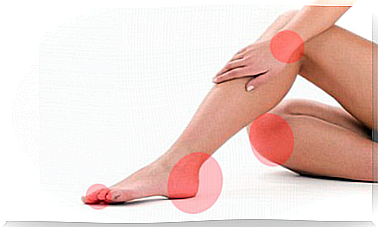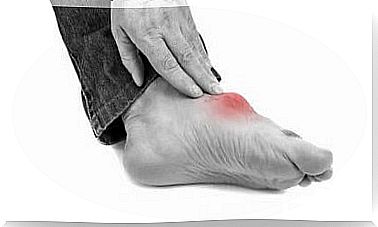Armpit Pain: What Are The Causes?
The armpit is one of the most sensitive areas in the human body. The discomfort located in this part of the body can come from an injury but also other factors.

Have you ever had armpit pain? Since there are many blood vessels, tendons, and nerves in the armpits, it is normal that at times you may experience discomfort. The armpits are, in fact, connected to certain muscles which can produce inflammation in the lymph nodes.
This is why it is important to identify the source of the disorder and assess whether the armpit pain is interfering with arm movements. If this happens, you should see a doctor. Only in the most severe cases, when the lymph nodes are damaged, surgery is necessary.
Symptoms
Here are the most characteristic symptoms that can appear with armpit pain:
- Ganglia
- Burn in the area
- Swelling
- Numbness
- Pain (severe, moderate or severe)
Causes of armpit pain
In the following, we are going to mention 7 main causes that can trigger armpit pain.

1. Muscle wrinkling of the armpits
This type of injury causes sudden, sharp pain in the armpit. People who lift weights or exercise usually suffer from this disorder.
Muscle tension causes weakness, stiffness, fatigue and in some cases burns. To remedy this, it is necessary to reduce the inflammation, avoid moving so as not to damage the torn muscles.
It is recommended to use cold compresses for 20 minutes or to opt for anti-inflammatory drugs. But above all, it is advisable to rest between 3 and 6 weeks.
2. Axillary lymphadenitis
This condition occurs when inflammation affects the lymph nodes. Lymphadenitis usually manifests in the neck, groin, and armpits. The main symptoms are:
- Fever
- Swelling
- Pain when touching
- Redness and numbness
Axillary lymphadenitis is caused by infection. Doctors then do a blood test to determine the cause, and in some cases, a biopsy must be taken to rule out the possibility of cancer.
3. Angina pectoris

Angina pectoris is manifested by severe pain. It is linked to a lack of blood in the heart muscle. This pain can spread to other parts of the body, such as the arms, shoulders, neck, back, and armpits. In this case, the patient has the following symptoms:
- Tired
- Dizziness and nausea
- Excessive sweating
If you have armpit pain and chest pain, it is recommended to see a doctor.
4. Hydradenitis suppurativa
Consider hidradenitis suppurativa as a chronic disease. It is characterized by the appearance of nodules, scars or abscesses in areas where there are apocrine sweat glands. This is why the armpits are concerned.
Inflammation creates tunnels under the skin that block the follicles. Among the most common risk factors are:
- Overweight
- Smoking
- Decreased immune defenses
- Hormonal alteration
5. Breast cancer
Armpit pain can be a warning signal for breast cancer , but it isn’t always. Do not panic. The goal is to prevent.
This type of cancer begins with the attack of cells towards the milk-producing ducts. It can also start in glandular tissue. If the lymph nodes are very inflamed, they can affect the armpit area. The warning signs are as follows:
- Inverted nipple
- Glands in the breasts
- Redness and itching of the area
- Scaling around the nipple
- Change in the shape and size of the mammary gland
If you observe any of the symptoms mentioned, you should do a mammogram or biopsy, as directed by your doctor, in order to find the cause of the armpit pain and thus find out whether it is breast cancer. breast.
6. The reflux
In medical terms, we know it as gastroesophageal reflux disease or indigestion. Stomach cells secrete a series of acidic fluids that aid in the digestion of food.
However, in some cases, the muscle weakens and stomach acids move up into the esophagus, causing a burning sensation in the chest area that can spread to the armpits.
7. Anxiety

Sometimes armpit pain can be the result of somatization. This means that, in reality, there are no physiological lesions that damage the lymph nodes, but the body manifests through this pain a state of prolonged stress or anxiety.
People with anxiety worry intensely and constantly, and may also experience physical discomfort. In this case, it is recommended that the person perform relaxation techniques in order to decrease anxiety. If you are unable to suppress the symptoms of anxiety, it is best to go to the doctor to prescribe more adequate medication.
Avoid self-medication
It is important to assess the discomfort before taking ibuprofen or any other medicine without first consulting your doctor. Keep in mind that taking such medication can mask the symptoms and delay management of the problem.








